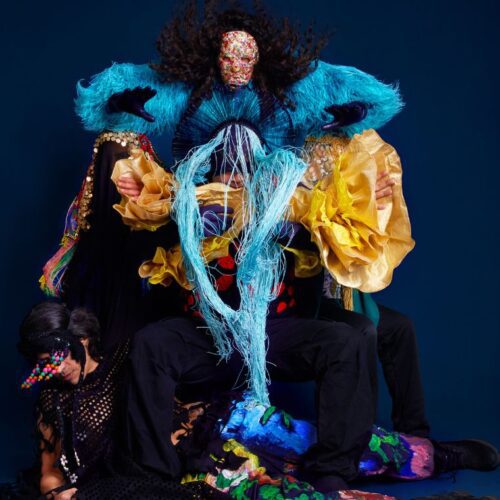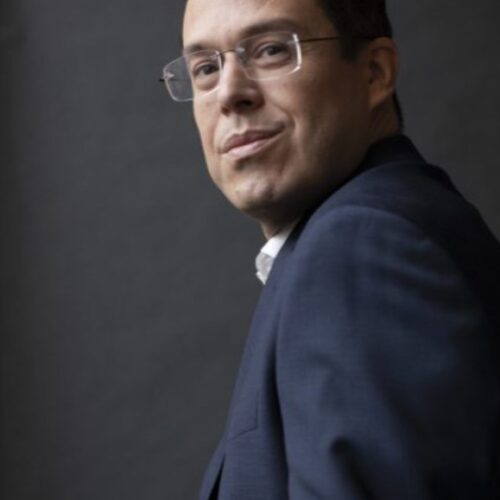Additional Information
Photo: Martin Girard/Shoot Studio
The spotlight was on Louis-Philippe Marsolais as he performed the French-horn encore that brought to a close the first European tour in the history of Montreal’s Orchestre métropolitain, at the Philharmonie de Paris.
“It was like weightlessness,” Maestro Yannick Nézet-Séguin recalls. “All of a sudden, there was no longer any barrier between emotion and playing. It gave us wings.”
Three years later, almost to the day, Louis-Philippe Marsolais, 43, embraces the lull caused by the COVID-19 pandemic, which has allowed him to catch his breath after a marathon of concerts, recordings and tours. From one day to the next, we went from 100 miles an hour to a wall,” recalls the bearded horn player. “It was great, it gave me a chance to step back.”
Principal horn of the Orchestre métropolitain (OM), member of the Pentaèdre wind quintet, professor at l’Université de Montréal and father of Violette, Henri, and Victor, Louis-Philippe Marsolais has not been idle since the beginning of confinement in mid-March. Like everyone else, the classical music industry has had to conform to this new norm of physical distancing and atomization of society.
Orchestras, the very incarnation of strength in numbers and esprit de corps, have been fragmented by health measures. It is difficult to become accustomed to the transformation of this environment for which tradition is the backbone. Abroad, for example, acrylic panels separate the musicians of the wind instrument section of the Hong Kong Sinfonietta. In our backyard, the OM has to occupy an entire hall – including the floor – in order to be able to rehearse with sufficient distance. Enough to distort the essence of classical music? Yes and no, answers Marsolais.
“[With distancing in the hall,] the speed of sound comes into play,” he explains. “We noticed at the beginning that we were always playing early or late. You always have to readjust the scales, it becomes mathematical.” This goes against an orchestra’s personality, he says, as he emphasises the communal qualities of music, where listening and reacting to the playing of others prevails. “For me, the great pleasure of making music is being with the people I love and having fun together,” says the musician, partially hidden by his spotted mask. He gets this feeling much more often “with his gang in an orchestra” than on tour as a soloist.

Rockstar in Austria, nuisance on the orange line
Marsolais cherishes unforgettable moments from his expeditions in Europe, Asia, and the Middle East. Like this time he went to Austria for the most important festival paying tribute to Schubert’s music, The Schubertiades. His Pentaèdre Quintet presented a newly released recording before “1000 old Austrians singing Schubert at night before going to bed”. Marsolais had experienced one of the moments in his career that made him feel like a superhero. “At the end, people came to us crying… it’s really quite a feeling,” he recalls today, wearing a Captain America T-shirt. “It doesn’t happen often in classical music.”
He first tasted this collective appreciation for classical music some 20 years ago when he was completing his training at the Hochschule für Musik Freiburg in Germany. After obtaining a DEC at Joliette and a BAC at McGill, both in music, he decided to go abroad to the home of Bach and Beethoven. “I used to get stopped on the street by passers-by who would tell me how lucky I was to play the horn, and that they couldn’t wait to hear me play,” he recalls. “Here in Montreal, you’re more likely to get yelled at in the metro because you take up too much room!”
You don’t need to have written a doctoral thesis to understand why classical music is so marginal here in Quebec. It has simply never been part of its (young) popular culture. However, can it still be described as inaccessible, or worse, elitist?
“We’ve tried hard not to,” says Marsolais. “There is so much diversity, so many free shows. It’s possible to follow the scene very closely, even for students or people with little income.” According to Marsolais, this has resulted in a rejuvenation of the fanbase of Montreal orchestras, whereas young professionals have been gaining ground on the bluehairs for the past decade. The OM has seen its proportion of unit tickets sold to the under-35s jump by 188% between 2015 and 2020. The same is true of the Orchestre symphonique de Montréal (OSM), where the number of subscription packages for those 34 and under also nearly doubled between 2015 and 2020.

OSM and OM, opposite atmospheres
In addition to being the solo horn for the OM, Marsolais also served as third horn for the OSM between 2013 and 2015. “I dug that job a lot less, it was much less demanding, but people found it cooler and I made five times more money,” he says with irony.
Shortly after his arrival in the Nagano troupe, “political jousts” got the better of him. Although he was assured that the brass section had never sounded as good as it did in with him present, he was given no clear explanation as to why he had been dismissed. “When all this happened, it really knocked me down,” he confides. “It made me lose faith in the importance of music, in a context like that.”
The months that followed this turning point in his career were not easy. Marsolais plunged into an implacable quest to prove to everyone that he was still first in class. With hindsight, he now understands the darker side of his competitiveness, which has sometimes overshadowed his interpersonal relationships. “When I was younger, I wasn’t aware of what it could do to others,” he says.
This departure from the OSM was perhaps a life-saver for Marsolais’ professional health. He was able to devote more time to the OSM, which he now places on an equal footing with its main competitor. “On paper, the OSM has better musicians,” the horn player says. Afterwards, you wonder how it is that the OM sometimes sounds better than the OSM. “It’s really a matter of cohesion.”
They owe this cohesion in large part to their captain, the Quebec prodigy Yannick Nézet-Séguin. “It makes all the difference in the world to have a leader who is strong, inspired, respected and competent,” says Marsolais. “There is no confrontation, no ‘I will play louder than you to show that I’m better’.” For me, it comes from the leadership of the person at the podium.”
Marsolais’ admiration for Nézet-Séguin is not unreciprocated, far from it. “When he became the main French horn of the OM, it was an extraordinary addition,” the conductor says. “Louis-Philippe has this way of inspiring us all. He is so dedicated and reliable, which is very important for horn players.”
Nézet-Séguin nevertheless describes his “fluidity of style” as “one of the things that sets him apart from the rest of the world, and the great horn players he knows.” It’s thanks, among other things, to his various orchestral and chamber-music experiences with Pentaèdre that Marsolais was able to build his enviable versatility. So much so that he estimates he has performed 90 percent of the French-horn repertoire that’s commonly played.
Making music for the right reasons
The next step for Louis-Philippe Marsolais? The organisation of an international French-horn festival, which had been suspended due to the pandemic. Until then, the most accessible of Quebec virtuosos advises neophytes not to be impressed by the immensity and complexity of the classical repertoire. “You can listen to classical music and think, ‘wow, that’s beautiful.’ You don’t have to say to yourself, ‘ah, there’s a 1-4-5-7-1 progression here!’” He also assures you that his grandiose knowledge of solfège and music theory has in no way affected his appreciation of his favourite non-classical artists – he’s followed the career of the Cowboys Fringants since their beginnings and loves the works of the great French chansonniers and American crooners.
Marsolais has the career he has because he “makes music for the right reasons.” He adds, “I don’t know if it’s because I came from another planet, but I never wondered if I was going to be able to make a living from it. I think that innocence at that moment in my life allowed me to go wherever I wanted to go, without needing security or answers about what was waiting for me.”
“Even when he was young, everyone admired Louis-Philippe,” Nézet-Séguin recalls. “He handles this with great humility. It’s a beautiful story that continues to be written through people, like Louis-Philippe, who have joined OM over the years.”
Sunday, 3 December, 2017. After performing a moving six-minute solo by Ravel in front of his lectern at the sumptuous Philharmonie de Paris, Louis-Philippe Marsolais burst into tears. At the end of this “moment of grace,” as his conductor described it, this likeable rock star from the shadows could once again say, mission accomplished.






















